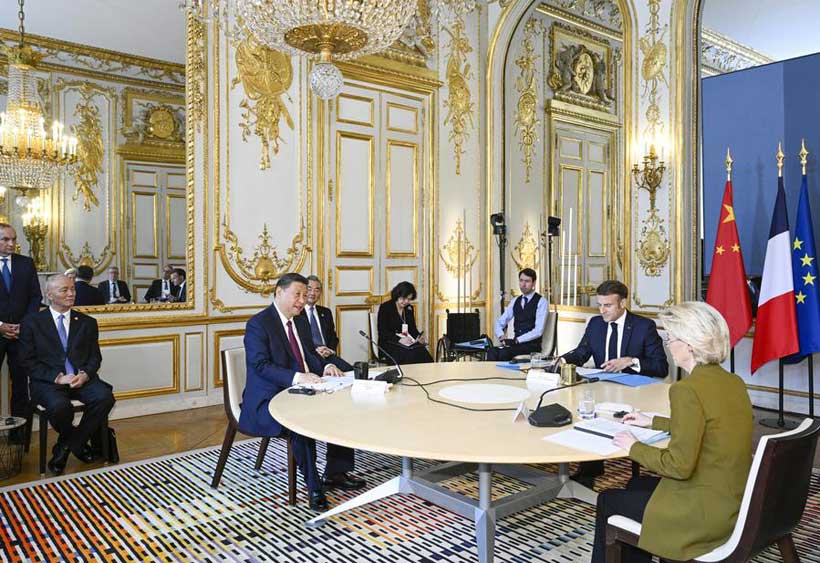The arrangement of Chinese President Xi Jinping’s recent visit to three European countries—France, Serbia, and Hungary—appears meticulously planned. Within the G7 group, France is often seen as an independent actor. In the European Union, Hungary has been regarded as the most independent-minded member since 2010, while Serbia has faced criticism from the U.S. and Europe for its pro-Russia and pro-China stance. Consequently, there exists among the Western public opinion that sees Xi’s visit as an attempt to divide the West.
Since the outbreak of the COVID-19 pandemic, global supply chains have been disrupted, and inflationary pressures have surged. The Russia-Ukraine conflict has further exacerbated these issues, with inflation levels increasing. Against this backdrop, the U.S. launched the Inflation Reduction Act to attract global capital, causing many companies from Europe, Japan, and South Korea to relocate to the U.S. This undermined the industrial systems of American allies, provoking criticism and protests. The escalating U.S. technology blockades against China have also affected major chip industry giants like ASML, triggering significant discontent.
In recent years, there are voices that suggested that China could exploit these contradictions, offering economic and political benefits to U.S. allies in Europe and Asia to disrupt or dissolve the global alliance system, thereby improving China’s international strategic environment by fragmenting the West. Yet, due to factors such as civilization stages, historical memories, and economic ties, the U.S. has strong cohesion with its allies, making it almost impossible to divide.
Firstly, the cohesion of the United States with its allies is based on shared stages of civilization. In the Four Stages of Civilization model proposed by Kung Chan, the founder of the Beijing-based think tank ANBOUND, the West and Japan belong to the “stable” stage, adhering to core elements of modern civilization such as liberal democracy, market economy, and rule of law. This results in high overall coordination among Western countries in international affairs. For instance, during the Russia-Ukraine conflict, under U.S. leadership, Western European countries imposed sanctions on Russia, even cutting off important natural gas imports.
The similarity in stages of civilization reinforces the internal cohesion among Western countries. Even with the prospect of Donald Trump’s return to office, Western European countries are not prepared to make peace with Russia separately. In the Asia-Pacific region, Japan and South Korea have also actively participated in regional alliances to contain China.
Although populist forces are prominent in the West, there is no widespread desire to abandon liberal democracy. Support for populist movements often arises from dissatisfaction with the establishment rather than a desire for an alternative political system. The main argument for supporting Ukraine is to uphold liberal democracy against Russia’s authoritarian regime. According to a European Council on Foreign Relations (ECFR) survey, a significant portion of Europeans view China as a competitor or threat, especially if China provides military assistance to Russia. The similarity in stages of civilization and institutional commonalities serve as powerful adhesive forces, binding Western countries to the U.S.
Secondly, historical memory plays a crucial role. The U.S. is often seen as a savior of the Western world at critical historical junctures. For example, the Normandy landings in 1944, the Marshall Plan, the Berlin Airlift, and the U.S. intervention in the Korean War are remembered as acts of great heroism or salvation. Eastern European countries view the U.S. as a liberator from Soviet rule, reinforcing their allegiance to the U.S.
Furthermore, tangible economic interests also bind the West together. Initially, China complemented the West with cheap labor and a large market. However, China’s industrial upgrades now pose competitive threats, such as in the electric vehicle industry. China’s sanctions on Australia and its industrial expansion in Africa and South America have also led to Western resistance.
Economic differences between the U.S. and its allies can often be compensated by the U.S.’s economic advantages. For instance, ASML’s sales losses in China are offset by sales in the U.S. Despite disputes, allied companies often benefit from U.S. policies.
Xi’s visit to Europe has achieved political and economic outcomes. However, Serbia plays a marginal role in Europe, and Hungary is a second-tier EU country with internal political challenges. Although France signed cooperation agreements with China, it also made crucial strides in military cooperation with Japan, suggesting that France’s military role in confronting China is more prominent than economic cooperation.
All in all, even if China does attempt to exploit contradictions within the West, the cohesion among Western countries, reinforced by shared civilization stages, historical memories, and economic ties, will ensure these countries to remain under U.S. leadership.
*Mr. Zhou Chao, Research Fellow for Geopolitical Strategy programme at ANBOUND
